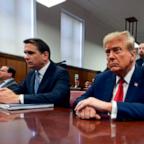Hugo Chavez Inauguration Absence Sparks Succession Debate
The Venezuelan president´s absence sparks succession debate.
Jan. 9, 2013— -- Venezuelan President Hugo Chavez will not be sworn into his fourth consecutive term in office later this week, a top government official said on Tuesday.
In a statement read out loud to Venezuelan legislators, National Assembly President Diosdado Cabello, said that Chavez needed more time to continue post-surgery treatment in Cuba, and was following instructions from his medical team that prevented him from returning to Venezuela.
Chavez´s presidential inauguration ceremony was scheduled to take place on Thursday January 10 in Venezuela´s National Assembly. The Venezuelan government says that Chavez will now be sworn into office at a later date by the country´s supreme court, as is mandated by Venezuela´s constitution.
But politicians from Venezuela´s opposition, are challenging this interpretation of the law. With some arguing that the January 10th inauguration date is not as flexible as the government says it is.
Some lawyers point out that Chavez´s third term in office officially ends on January 10. They say that his inability to be sworn into his fourth term in office creates a power vacuum, and should prompt a formal inquiry into Chavez´s health condition that would determine whether he will be fit to rule the country for the next six years.
Another possibility touted by the Venezuelan opposition is that the President of the National Assembly should take over after January 10, while new elections are organized.
Opposition leader Henrique Capriles, who lost to Chavez in the last presidential elections, said that Chavez´s mandate cannot be automatically renewed.
In a press conference held on Tuesday, he pointed out that if no steps are taken to replace Chavez after the offical inauguration date, the country will be ruled by Vice President Nicolas Maduro, who was appointed to his job by Chavez, and has been granted several presidential powers since the socialist leader headed to Cuba for cancer treatment in early December. Maduro however was not elected by the people, as the post of Vice President is not an elected office in Venezuela.
"There is no monarchy in Venezuela," Capriles said. "This is not the cuban system were one leader hands power over to the next."
According to the government´s interpretation of the constitution, Chavez´s mandate cannot be taken away from him until there are strong motives to suggest that he will be "permanently absent," from his post.
The government also believes that Chavez´s fourth term in office automatically begins on Thursday January 10, whether he is sworn in or not. Government leaders say that as long as Chavez is temporarily absent from his post, but not permanently absent (i.e. dead), he can continue to delegate presidential tasks to Vice President Maduro.
The situation could go on for days, or months, depending on how Chavez´s health condition plays out. Or even for years, as one article suggests.
Venezuela´s Supreme Court could intervene in the matter as well. But as it is packed with supporters of President Chavez, it is likely to follow the decisions that have already been taken by his closest aides.




